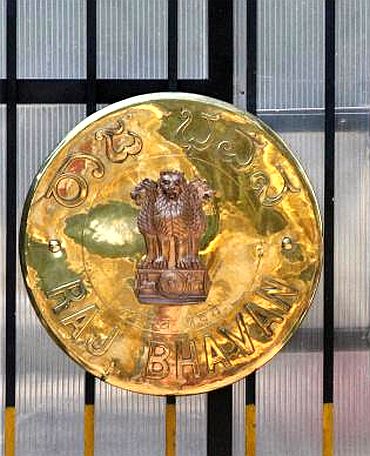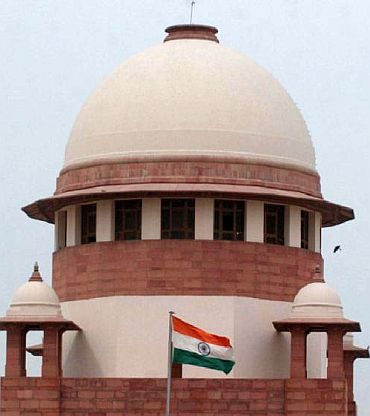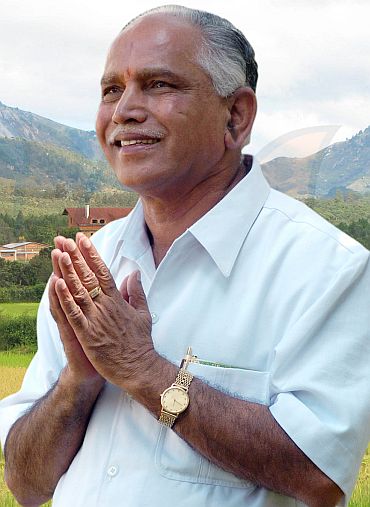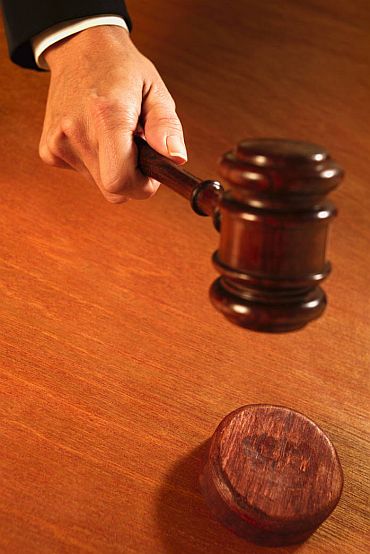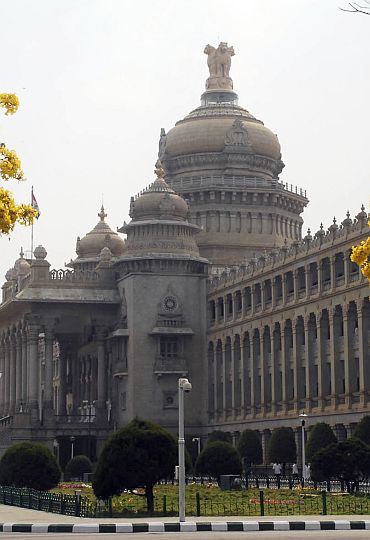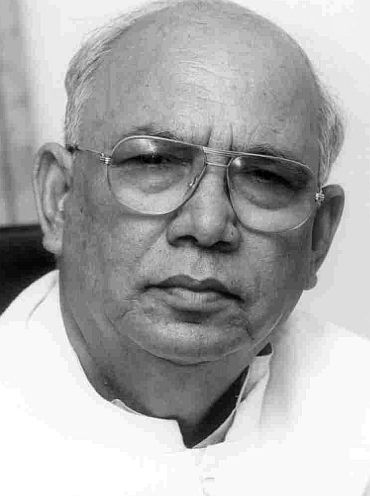 | « Back to article | Print this article |
Exclusive: Arun Jaitley on the Karnataka muddle
On 13 May a bench headed by Justice Altamas Kabir quashed Karnataka Speaker K G Bopaiah 's decision to disqualify 16 MLAs ahead of the no confidence motion last year which had ensured survival of the B S Yeddyurappa government. The judges said that basic constitutional values and principles of natural justice were not observed by Speaker in disqualifying the 11 rebel BJP and five independent legislators.
In this exclusive column for rediff.com Arun Jaitley, senior leader of BJP and a distinguished lawyer, raises concerns regarding the impact of the apex court judgment on the spirit of the Tenth Schedule of the Indian Constitution that deals with the anti-defection law.
Jaitley argues that the latest interpretation offered by the honourable judges, "gives enough play of joints to potential defectors to misuse the provisions of the Tenth Schedule." According to Jaitley the judgment that weakens the spirit behind anti-defection law is being relied upon by the Governor to recommend the President's Rule in the state.
Jaitley, in his column argues, "These are the consequences that an erroneous judgment can inflict on the democracy."
The Governor of Karnataka has sent a recommendation to the Union government recommending action under Article 356 of the Constitution. This has been widely reported in the media.
The government headed by B S Yeddyurappa has won most of the bye-elections in the last few years. It has succeeded in the municipal elections and panchayat elections. The popularity of the government is not in doubt.
The government has demonstrated support of over 121 MLAs in a house whose present strength is 223. The council of ministers has requested the Governor to call a session of the assembly on May 16.
The Governor declined to call the session and instead sent a recommendation to the Centre. The contents of the recommendation are not known. The press statement issued by the Raj Bhavan states that the basis of the recommendation is a recent judgment of the Supreme Court in the case of disqualification of MLAs.
Click on NEXT to read further...
A court judgment cannot be basis for Governor's recommendation
It appears unsound that a court judgment could be a basis for a recommendation of the Governor. If the Speaker decides a particular issue and the high court upholds its validity, the fact that the Supreme Court reverses it, is the strength of judicial review and a corrective system of appeals inbuilt in our legal system.
It can hardly indicate that because of this judicial process governance in the state cannot be carried out in accordance the Constitution.
Since the Governor has made the judgment as a basis, I shall endeavour to analyse the principal judgment in the MLAs' disqualification case. I am for the present leaving out procedural issues such as compliance of principles of natural justice and even the case of the five indepent MLAs who joined the government.
I shall deal with only the case of 11 MLAs (belonging to the BJP). This is not withstanding the fact that this issue has become academic for two reasons.
Firstly, the Supreme Court itself has said that these 11 MLAs continue to be and always were the members of the BJP. Additionally, these MLAs have already publicly stated and written to the Governor that they are members of the BJP and fully support the government headed by Yeddyurappa.
How did the controversy arise?
How did the controversy in this case then arise? These 11 MLAs wrote a letter on October 6, 2010 to the Governor. The letter is reproduced hereunder:
"His Excellency,
I was elected as an MLA on BJP ticket. I being an MLA of the BJP got disillusioned with the functioning of the government headed by B S Yeddyurappa.
There have been widespread corruption, nepotism, favouritism, abuse of power, misusing of government machinery in the functioning of the government headed by Chief Minister B S Yeddyurappa and a situation has arisen that the governance of the State cannot be carried on in accordance with the provisions of the Constitution and Yeddyurappa as chief minister has forfeited the confidence of the people.
In the interest of the state and the people of Karnataka I hereby express my lack of confidence in the government headed by B S Yeddyurappa and as such I withdraw my support to the government headed by B S Yeddyurappa the chief minister.
I request you to intervene and institute the constitutional process as constitutional head of the state
Signed
An analysis of the letter reveals that the MLA's submit that they are disillusioned with the functioning of the government headed by Yeddyurappa.
Loopholes in the anti-defection law
They further make serious allegations against the government and allege that a situation has arisen that the governance of the state cannot be carried on in accordance with the provisions of the Constitution.
They further allege that the chief minister has forfeited the confidence of he people and that they express lack of confidence and withdraw their support. They asked for an intervention and initiation of the constitutional process as the constitutional head of the State.
The Tenth Schedule of the Constitution is popularly known as the anti-defection law. It was a positive constitutional development initiated by late Rajiv Gandhi when he was the prime minister. The essence of the Tenth Schedule is that parliamentary democracy functions on the strength of the party system.
If you are elected as a candidate of a political party you commit a political sin by voluntarily giving up membership of the party and therefore deserve to be penalised in terms of forfeiture of your membership.
There was an escape provision which was misused in the name of splits. More people had split their parties in order to get ministerial berths rather than on ideological grounds. As a law minister I had proposed the deletion of this provision.
The Standing Committee headed by Pranab Mukherjee recommended its deletion. This amendment was brought in the Tenth Schedule of the Constitution. To maintain purity of politics and avoid horse trading the Tenth Schedule is a landmark provision in the Indian Constitution.
When does an MLA give up his party membership?
How does one determine whether a person has voluntarily given up the membership of a party or not? It is not necessary that a person writes a formal letter of resignation. The Supreme Court has held that this has to be determined on an analysis of all the antecedent circumstances and the totality of facts.
After writing this letter the MLAs had disappeared from the state. They went to Goa and various other places. Before the Speaker they did not even deny that they had gone out of the state.
They were seen actually hobnobbing and negotiating with (Janata Dal-Secular leader) H D Kumaraswamy. They had given several interviews to this effect to the media. Was it then unreasonable for either the Speaker or the Karnataka high court to come to a conclusion that this amounted to a voluntary relinquishment of the membership of the party on which they were elected to the assembly.
They obviously wanted the government to be dismissed and the constitutional process they referred to in terms of the governance of the state not being possible in accordance with the Constitution was the invocation of Article 356. They borrowed the language from Article 356.
What the Supreme Court held
The legislature functions independently of the judiciary. The very concept of separation of power respects the decision of the Speaker. The Supreme Court has balanced the primacy of the Speaker with judicial review by holding that ordinarily the court will not sit in appeal of over the decision of the Speaker.
The courts will interfere only if the decision on merits that the Speaker takes is a perverse view or a view which is not possible. If two views are possible the courts don't interfere with the decision of the Speaker.
Despite there limitations the Supreme Court held that "The 'Constitutional process' as hinted in the said letter did not necessarily mean the constitutional process of proclamation of President' Rule but could also mean the process of removal of the chief minister through constitutional means. On account thereof the BJP was not necessarily deprived of a further opportunity of forming a government after a change in leadership of the legislative party."
The Supreme Court then goes on to accept the argument of the MLAs to suggest that they had merely a change of leadership within the party in mind with another chief minister of the BJP. The Supreme Court further accepts the argument that their going to Goa and other places after writing this letter (though not denied by them) could not be used evidence against them.
The Supreme Court is final but not infallible
We live in a real world. We know what the MLAs did. They wanted the government to go. The language of their letter was clear. Their subsequent actions corroborated their intentions. If they wanted a change of leadership within the party they should have written to the party president and not to the Governor of the state.
Even though the issue has become academic because the MLA's are back in BJP and the Supreme Court has held them to be members of the BJP and bound by its whips. I am writing this because of the adverse consequences it has on the functioning of the Tenth Schedule of the Constitution.
An interpretation of this kind gives enough play of joints to potential defectors to misuse the provisions of the Tenth Schedule, play games with political morality and then put on an innocent expression and allege that they have done nothing wrong.
The Tenth Schedule was legislated by the government headed by late Rajiv Gandhi with a noble intention. It was further strengthened by the National Democratic Alliance government. Some provisions have been weakened by this judgment. I am sure on a future date this judgment will be re-visited.
The Supreme Court is final. It is not infallible. Even erroneous views of the courts are binding. The Governor now seeks to rely on this reasoning in his recommendation to the Centre. These are the consequences that an erroneous judgment can inflict on the democracy.
We don't have to merely learn to live with these errors. An erroneous judgment is a challenge to the future to correct the error in to which the judgment has fallen.
